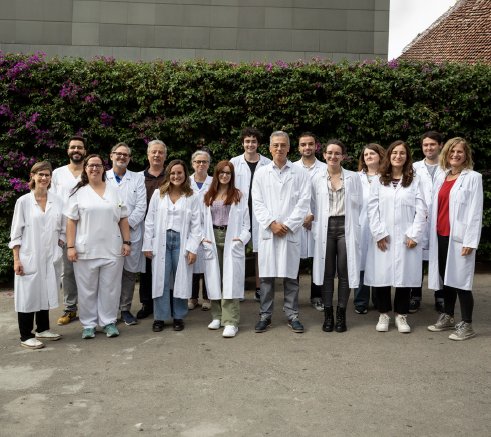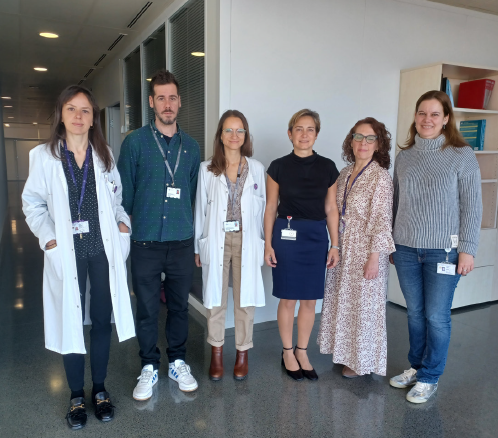Sant Pau
Research Institute
SCIENTIFIC REPORT
Who we are
The Sant Pau Research Institute is a Research Centre of Catalonia (CERCA center) and has been accredited as a Biomedical Research Institute by the Spanish Institute of Health Carlos III (ISCIII) since 2011.
Located at the Sant Pau Health Campus, the IR Sant Pau’s mission is to improve both populations’ health and life quality through the production and dissemination of scientific knowledge, health-care innovation, and the application of these advances to clinical practice and health-care policy. Is one of the most active research centers in Catalonia particularly for translational research and the application of discoveries to clinical practice.
Our Research
Research Areas
Cardiovascular Diseases Area
Onco-Hematological Diseases Area
Neurological Diseases, Neurosciences and Mental Health Area
Epidemology Public Health and Primary Care Area
Translational Medicine Area
Cardiovascular Diseases Area
The incorporation of new technologies that facilitate molecular profiling and gene regulation has led to innovative research into heart and other cardiovascular diseases including arrhythmias, aorta aneurysm, vascular diseases, thrombosis, etc. The great diversity of groups in this area gives varied perspectives to ongoing research, whether in developing or testing the effectiveness of new biomarkers (as in the investigation of the metabolic and genetic bases of cardiovascular diseases) or therapeutic applications in the short term. Before final translation to humans, many of the advances in this area can be validated in animal models including small and large mammals including pigs.
Onco-Hematological Diseases Area
A broad range of translational cancer research is conducted in this area, particularly in sarcomas, head-and-neck, breast, ovarian, endometrial, colorectal, and hematological cancers, among others. Research covers a wide range of fields, with disciplines that include from genetic research on cancer susceptibility syndromes to advanced therapies such as those based on targeted drug delivery with nanoparticles, preclinical development of new anticancer agents with disease-specific mouse models, immunotherapy with CAR-T cells, gene therapy, drug repurposing, and predictive molecular markers. Next-generation sequencing approaches are developed and applied to identify novel prognostic or response factors. A large number of clinical trials are performed within this area by our clinical researchers, including phase I, II and III trials with new anticancer drugs.
Neurological Diseases, Neurosciences and Mental Health Area
This area covers research in neurological, neurodevelopmental and mental disorders. Among these are diseases such as stroke, neuromuscular conditions, neurodegenerative diseases, schizophrenia, depression, or chronic pain. A large variety of neuroscience techniques are used in the area. Some groups work on the genetic bases of neurological diseases, the identification of biomarkers, brain imaging, neurosurgical methods, deep-brain stimulation or omics sciences, while other groups work with models of pain, in the biology of synapses or neuropharmacology. Large population cohorts of patients with clinical follow-ups are analyzed in this area.
Epidemology Public Health and Primary Care Area
Research in this area involves the study of population health and its social, political, and environmental determinants with special attention to inequalities and their consequences. It evaluates the effectiveness and health impact of public interventions and policies, as well as the promotion of evidence- based practical medicine to make health intervention more effective, appropriate, and safe. Also important is the development and evaluation of methods or strategies to improve the generation, evaluation, communication and transfer of scientific evidence. This area finally studies the epidemiology of communicable diseases in the population of Barcelona, with special attention to the impact of the prevention and control strategies developed. The aim of this area is therefore to achieve wellness in public health through improving policies and medical management.
Translational Medicine Area
Sant Pau Hospital is a tertiary high-complexity university hospital and, together with Fundació Puigvert, covers all specialities in medical care. This complexity leads to a high variety of biomedical translational research to improve patient’s care in multiple fields including inflammatory or immunological processes and on factors linked to the innate immune system, osteoporosis, nephrology, surgery, aging-related macular degeneration, microbiology and infectious diseases, diabetes, pituitary, and other endocrine diseases, respiratory diseases, or perinatal health research and clinical approaches based on human cells and tissues. The main focus of this research area is evidence-based translational medicine to improve patients’ care.
Associated Groups
Transversal Programmes
Advanced Therapies
Immunotherapy, gene and cell therapy, target drug delivery with nanoparticles, synthetic lethality or drug repurposing are examples of research on advanced therapies that can be applied to several oncological, cardiovascular, or neurological diseases among others. Research shows this programme will lead to new treatments and therapeutic strategies to improve patients’ lives.
Genomic Medicine and Rare Diseases
Technological and bioinformatics advances in the field of genomics led to a strong impact not only on the diagnosis of rare genetic diseases but also on determining risk factors, prognosis, and treatment of a growing number of highly prevalent pathologies. In this program we face the era of personalized precision medicine and address the challenge of diagnosing genetic disorders sooner and better.
Biomakers, Prognostic and Diagnostic
Research on disease biomarkers is essential in high-complexity medical care as it allows for adjusting the diagnosis and predicting the prognosis and drug response. Biomarkers are also essential for the proper follow-up of clinical trials with new drugs. The research done in this program will help define what is the best journey for our patients, from diagnosis and clinical follow-up to treatment.
Better Health Care
We are an Institute with healthcare professionals linked to all medical specialties and nursing. The translational research of this program aims to respond to the clinical challenges of patients in the form of healthcare improvements. This is evident in improvements in diagnosis, medical, or surgical procedures or care circuits always focused on the benefit of the patients.
Women’s Health and Gender
Biomedical research has demonstrated the importance of sex, gender, and intersectionality in health, well-being and disease progression to the extent that it is now difficult to justify healthcare and research without a gender perspective. In this program we support the integration of a sex/gender perspective into research content to fill existing knowledge gaps, increase the reproducibility of studies by making them bias-free, contribute to minimizing delays in diagnosis and unexpected adverse effects, and increase equity and social justice. In addition, we promote research on women’s health and women’s diseases to contribute to the impact of our research on personalized medicine.
COVID-19 Research
The outbreak of the SARS-CoV-2 virus and the consequent pandemic has driven much research projects on COVID-19, including the effects on pregnancy and childbirth, the genetic or individual factors that determine its severity, the physiological mechanisms of infection and immune response, or clinical trials with new drugs. This program adds knowledge for a common goal: understanding to fight the disease.




